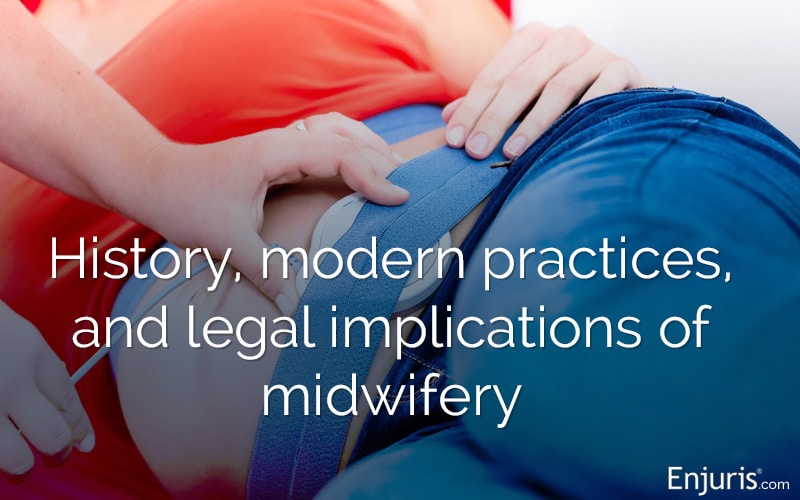Hablamos español.

Can a midwife be sued for medical malpractice?
As the midwife profession has modernized, so have the potential legal implications, especially if complications occur during childbirth.
Midwives have a long history of assisting with childbirth in the United States, dating back to the early parts of the 19th century when midwifery was the most customary practice for pregnancy care.
By the 1980s, midwives attended only 1.1 percent of births. However, midwifery is experiencing a bit of a renaissance, and midwives now attend roughly 12 percent of United States births, according to Oregon Health & Science University’s Center for Women’s Health.
Modern midwifery has evolved with advancements in medical science, but with this evolution comes legal ramifications, especially when complications arise.
What is a midwife?
A midwife is a medical professional who offers specialized care to women during their pregnancy, during labor, and after the birth of their child. Their education and training center around the natural aspects of childbirth, ensuring both the mother’s and the newborn’s health.
Although the term “midwife” may sound old-fashioned, today’s midwives pursue their education via dedicated programs.
There are four types of midwives in the United States today:
- Certified nurse midwife (CNM): A CNM is an advanced practice registered nurse (APRN) certified in midwifery through the American Midwifery Certification Board (AMCB). CNMs are qualified to provide a broad range of services to women, including prenatal care, labor and delivery support, postpartum care, and gynecological services.
- Certified midwife (CM): A CM is a midwife who completed a midwifery program and attained an AMCB certification but is not a nurse. CMs provide care to women throughout childbirth, including prenatal, intrapartum, and postpartum care.
- Certified professional midwife (CPM): CPMs are non-nurse midwives who earn midwife certification through apprenticeships or educational programs that are accredited by the Midwifery Education Accreditation Council (MEAC). CPMs focus on out-of-hospital births.
- Lay midwife: Lay midwives are self-taught or informally taught individuals who practice midwifery without any formal education or certification. They often provide care in home birth settings, primarily for uncomplicated pregnancies and births.
According to the American Midwifery Certification Board, there are roughly more than 12,000 CNMs and more than 100 CMs in the United States. The majority of midwives are CNMs.
The key differences between midwives and obstetricians
It’s important to understand that while both midwives and obstetricians play crucial roles in childbirth, their approaches tend to differ. Obstetricians are medical doctors specializing in childbirth and reproductive health. They undergo extensive medical schooling and training, focusing on high-risk pregnancies and surgical interventions.
Midwives, on the other hand, often emphasize holistic and patient-centered care. Their approach tends to support natural childbirth, focusing on minimal medical intervention. This is not to say that obstetricians are better than midwives or vice versa, but it’s important to understand these general differences when considering potential legal issues.
Potential liability of midwives
In the unfortunate event of a birth injury, several questions may arise. Was the midwife negligent? Were established protocols followed? Was there a failure to refer the mother to a medical doctor when complications arose?
To establish negligence in a birth injury lawsuit involving a midwife, you typically need to prove:
- The midwife owed a duty of care to the mother
- The midwife failed to exercise the degree of care and skill expected of a reasonable midwife in the profession, and
- Such failure was the actual and proximate cause of the patient’s injury
To put it another way, the plaintiff, with the assistance of a birth injury attorney, will attempt to persuade the judge or jury that the midwife failed to act with the same level of care that an ordinary midwife with the same training and experience would have. Meanwhile, the defendant will attempt to persuade the judge that the midwife acted competently.
In most cases, plaintiffs and defendants will present testimony from experts to support their arguments.
Licensed midwives typically carry malpractice insurance that can help pay damages in the event of a lawsuit. Unlicensed midwives may not have malpractice insurance, making it more challenging—though not impossible—to collect damages even if a lawsuit is successful.
Factors contributing to midwife-related birth injuries
While most midwife-assisted births result in healthy outcomes, specific situations might increase the risk of birth injuries:
- Failure to monitor: The failure to correctly monitor fetal heart rates or maternal distress can lead to delayed interventions.
- Lack of necessary equipment: Home births, in particular, might lack the medical equipment found in hospitals, potentially complicating emergency situations.
- Delay in referral: In high-risk situations, delays in transferring a mother to a hospital or obstetrician can lead to preventable complications.
- Inadequate training or experience: Like all professionals, there can be variances in the training and experience of midwives.
A Pennsylvania couple, Amanda B. Cruz and Michael Lohier, were awarded $6.4 million after their baby tragically died days post-birth.
The Lehigh County judge deemed Laurice Dunning, the midwife they engaged, negligent. Dunning, who was not state-licensed but operated as a certified professional midwife, didn’t advise Cruz to stay under medical oversight during pregnancy despite Cruz being high-risk. Dunning also let the pregnancy exceed the standard 40-week term without suggesting an induction or C-section.
Potential injuries caused by midwives
Midwives have the potential to inflict similar harm as physicians or other medical practitioners. Injuries might include:
- Infections
- Brain disorders like Cerebral Palsy
- Physical trauma
- Complications like shoulder dystocia
- Brain damage
Find out the five most common types of birth injuries, and learn the difference between a birth injury and a birth defect.
When to consult a personal injury attorney
If you believe a birth injury resulted from negligence or a lack of care during a midwife-assisted birth, consulting with a personal injury attorney is essential. They can assess the specifics of the case, advise on the likelihood of a successful lawsuit, and guide families through the complexities of legal proceedings.
Seeking justice not only offers potential compensation for medical bills, emotional distress, and other damages but also ensures that standards are upheld within the midwifery profession.
Could a Tragedy Have Been Avoided?
A woman died without ever getting to see or hold her baby. Now, her family claims she did not have access to the services she needed.
See our guide Choosing a personal injury attorney.


